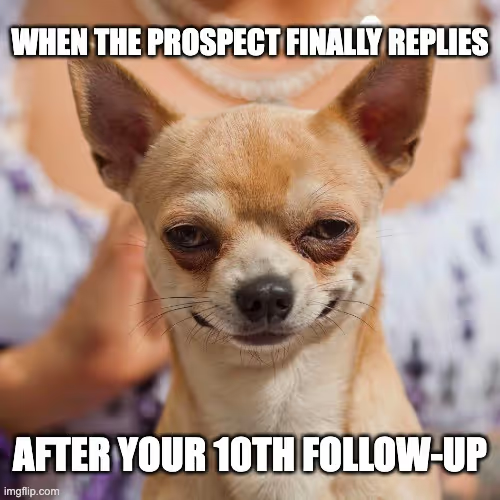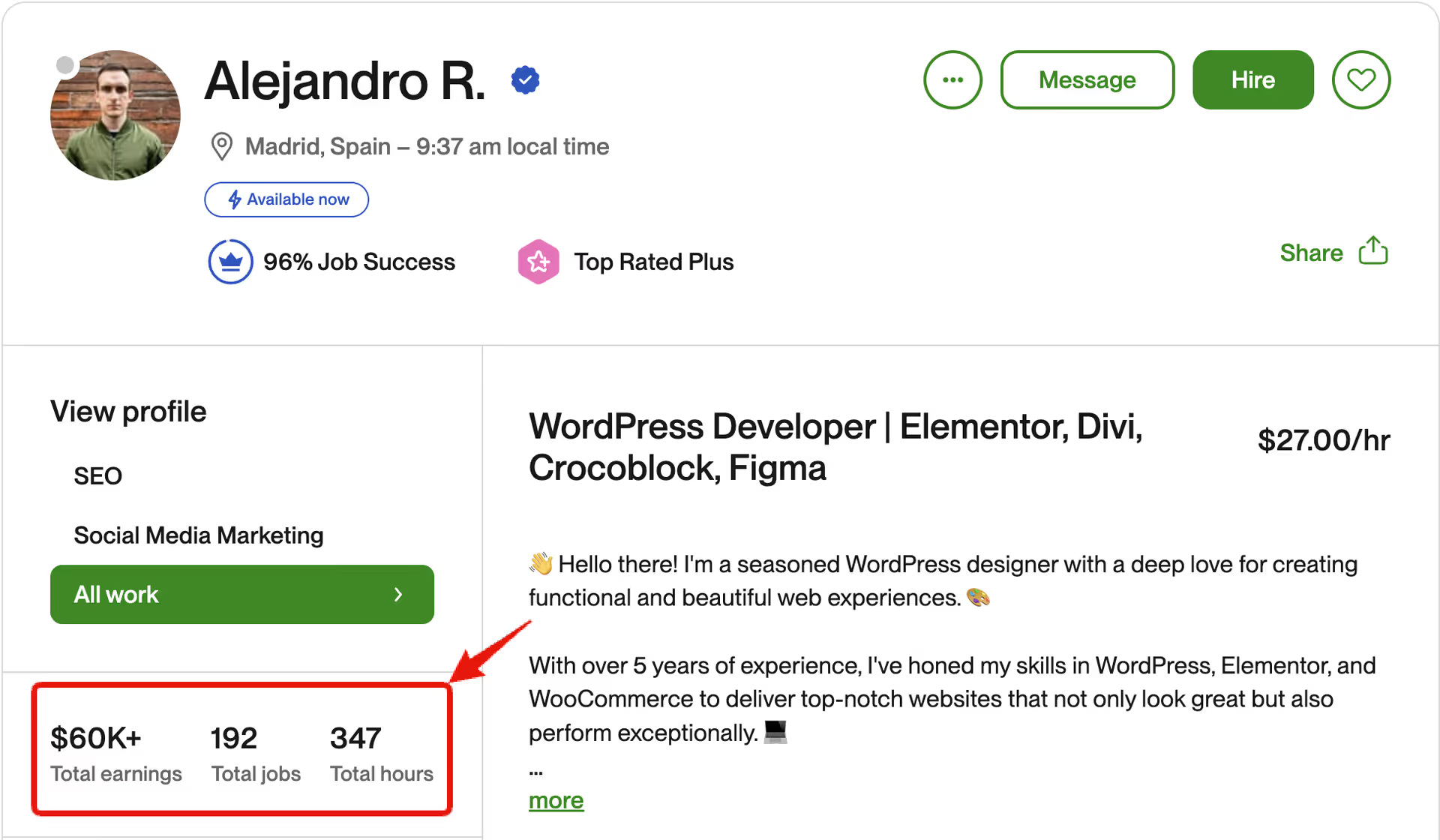A college grad with no experience
Alejandro has always enjoyed writing. In fact, he’s been an avid writer since he was just a kid. His passion for using words wisely and creatively followed him all the way to his college days. By the time he finished his undergrad studies nine years ago, Alejandro was unsure about what he wanted to do. A networking event led him to discover Upwork, a place where he could simply start a profile and sell the one skill that he was confident in:
I was just fresh out of college, and I had no real work experience or anything like that. So I was focusing on writing, which was something that I really enjoyed since I was a kid, and basically I just went with it.
Alejandro’s Upwork Monopoly 🇪🇸
To Alejandro’s surprise, Spanish writing skills were quite coveted on Upwork. Back in 2016, there weren’t enough Spanish writers on the platform, and it seemed that Alejandro appeared in the right place at the right time:
People would look for a Spanish writer, and then apparently, there would be nobody else there, just me. So I got three proposals every day or something like that. It was crazy.
A fresh college graduate now found himself getting more inbound leads than he was actually having to send proposals out for. Without realizing it, Alejandro had conquered the niche that lacked experts with his skills.

The first real client 🤝
Before he knew it, Alejandro quickly got his first real client:
I found a guy at a time when affiliate marketing was still huge. This guy had many Amazon affiliate websites in different niches, and he needed somebody to write for him. I was just writing the text for the platforms.
Briefly, Alejandro was able to make his first real steps towards financial independence. Upwork allowed him to have an income of his own and get a taste of adult life. His experience exemplified that before getting to major highs, you’ve got to start somewhere and let things snowball from there:
I went from zero income to a small income for myself. I was still a student back then, so it was pretty cool making money from home. And that lasted quite a while actually, like more than a year. And then it snowballed from there.
We imagine Alejandro's workday as a copywriter looked something like this:
Lessons learned the hard way
Back in the day, when Upwork was in the early days of its growth path, things were simple. Both clients and freelancers could find a match in a matter of days or even hours. As the platform grew, however, things got a bit more complicated. With so many players on Upwork, it was now necessary for Alejandro to find a specific direction to go and not get lost in various industries:
Nowadays, I find it way more important to have a niche and just focus on one thing. I used to have everything all over the place because I wanted to cater to many different people. And I was not getting any replies at all. And since I've converted my profile to just one narrow single thing, I'm getting way more replies again. So that's the most important thing, I guess.
With the number of clients constantly growing and competition rising, messages got lost, and communication became much harder. Not bugging clients enough, however, meant lost business opportunities.
Today, Upwork is a place of bustling service exchanges. Impatient employers need fast communication and reminders. With so many agencies and freelancers, it is vital to continuously follow up. Otherwise, someone else will take your spot:
I've been guilty of not doing this, actually, and it's been a game changer for me — following up. A lot of the time, clients might forget about you, or they might get busy with something else. It helps to have a couple of follow-up templates or ideas and just stick with it. We might feel like we're bothering people if we ask them too many times, but as long as they don't say no, I think we should keep following up, and that's pretty helpful in the case of those clients who seemed to have been lost at first.

Shifting gears toward automation
Over the years, Alejandro has built his business into what is today a growing web development and marketing agency, Areia Consulting. However, his Upwork operations became too complicated and chaotic. He couldn’t keep up with new job posts and proposals and communicate accordingly.
I was sending proposals myself here and there, but I didn't really have the time to do it. And I think over the last year, I hadn't really worked that much on Upwork. I was thinking of just abandoning it completely. So, I was in a bit of a frustrating position.
At this very moment, Alejandro realized that he needed a tool for automating the Upwork processes. In his ambitious search, he stumbled upon GigRadar which took some time to adjust to but ended up being a decision he hasn’t regretted once:
There are some tools that don't apply on your behalf, but they send you a notification when a new job post is created and that's relevant for you. I tried that and then I was going crazy with notifications on my email. All the other tools that I tried to use, they actually took up more of my time. And then, I talked to you guys and learned how the GigRadar process worked on Upwork, and it seemed fairly automatic. Of course, there's some work involved from my end, replying to clients and so on. I mean, that work has been great for me in the past and I wanted to give it another try. And I've been with you for nine months, I think.
Transitioning to GigRadar took effort on Alejandro’s end in the early stages. He realized that he needed to organize several elements of his business for the tool to function as efficiently as possible:
My profile was not very optimized. I was getting replies, but a lot of them were not really relevant or the pay was not great and then I was spending a lot on connects and I was not sure if it was worth it. So I was working with your support team and they helped me a lot with optimizing my profile, the scanners and so on and that really helped!

The bottom line
Because Areia Consulting originally didn’t have any organized processes, a lot of money went to waste. Lack of efficiency led to Alejandro spending $2,000 per month on connects without even getting a sufficient number of replies. It was time to fix the issue:
At some point, I was sending like a thousand proposals per month. And that's crazy. I think I was spending like $2,000 per month on connects because I was not getting as many replies. But after I optimized it, now the amount I need to spend decreased by half. I'm like a third or a fourth of that right now. And I get more replies than I used to. So I wouldn't know exactly how many, but in the last year, I think since September, I've earned like $30,000. I mean, it's not crazy numbers, like the million dollars they were saying earlier, but hopefully I'll get there.

Full speed ahead with Growth Manager ⚡️
Alejandro was getting acquainted with GigRadar and discovering room for improvement in his business. He learned about the program to help agencies grow and soon joined it in hopes to advance his company’s performance:
That was like night and day. Before Growth Manager, I was struggling to get leads through Upwork and to cover costs and so on and now it's way better. […] I had like three different profiles, completely different niches. I was not really focusing on one narrow thing. That's what Growth Manager helped me with the most. And that made all the difference.
Closing Thoughts
Upwork ain’t easy. You knew it before reading this. But here’s a thing: laying down the strong groundwork is key. Alejandro’s agency is one of many GigRadar’s client success stories that show how inevitable growth on Upwork is if you find the right niche, set up a strong profile with a deep area of expertise, and use powerful automation to help you get the leads you need to grow your business!


